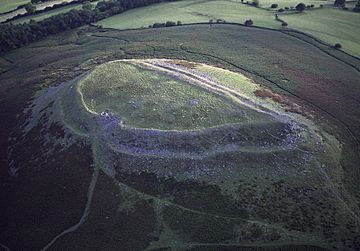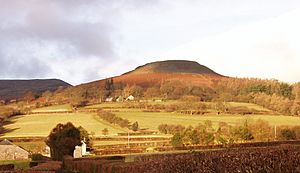Crug Hywel facts for kids
Quick facts for kids Crug Hywel |
|
|---|---|

Crug Hywel, Black Mountains
|
|
| Highest point | |
| Elevation | 451 m (1,480 ft) |
| Prominence | < 10 m |
| Naming | |
| English translation | Hywel's mound |
| Language of name | Welsh |
| Geography | |
| Location | Black Mountains, Wales |
| OS grid | SO225207 |
Crug Hywel is a special mountain in south-east Wales. It is sometimes called the Table Mountain in English. This is because its top is very flat! It stands 451 meters (about 1,480 feet) above sea level.
Crug Hywel is part of the Black Mountains. It looks down over the town of Crickhowell, which is named after it. The name "Crug Hywel" comes from the Welsh words crug, meaning "hillock" or "mound", and hywel, meaning "conspicuous" or "visible". So, it means "Hywel's mound" or "the noticeable hill".
The very top of Crug Hywel has an ancient fort. This fort was built by the Celts during the Iron Age, a very long time ago! You can still clearly see the old earth and stone walls and ditches that protected the fort.
Many people enjoy visiting Crug Hywel. You can reach it by walking paths from nearby towns like Crickhowell and Llanbedr. It is also a stop on a famous walking trail called the Beacons Way. The mountain is in an area where everyone has the right to explore and walk freely.
How Crug Hywel Was Formed
Crug Hywel is made of a type of rock called Old Red Sandstone. These rocks were formed during a time called the Devonian period, millions of years ago. The top part of the hill has even harder rocks. These rocks are part of something called the Quartz Conglomerate Group.
Scientists can see that the layers of rock in Crug Hywel tilt more steeply to the south. This shows that the whole mountain mass moved a long time ago. It is a great example of a "translational slide," which is a type of landslide. This means a large block of rock slid down a gentle slope.
 | Mary Eliza Mahoney |
 | Susie King Taylor |
 | Ida Gray |
 | Eliza Ann Grier |


